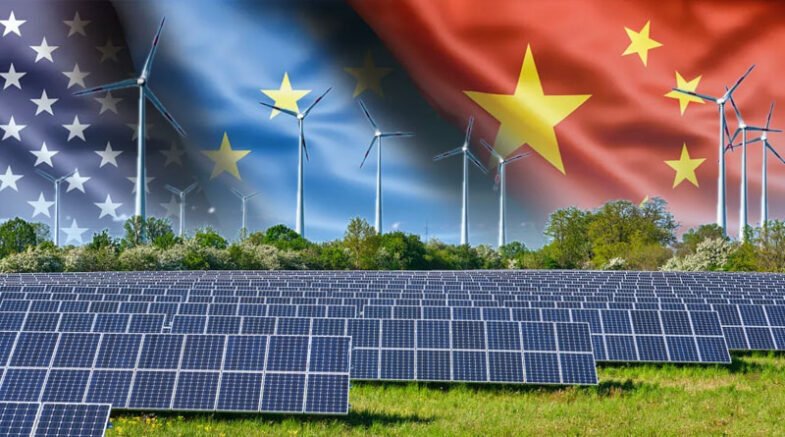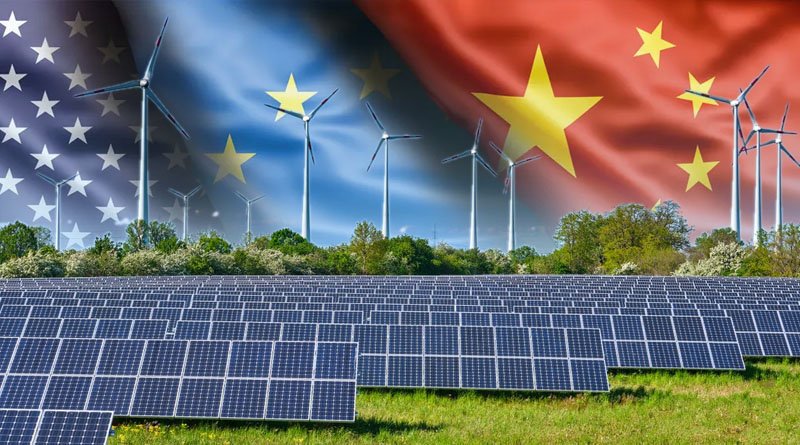By 2030, clean technology is projected to have a global market value of 600 billion euros ($630 billion), more than tripling what it is today.

To counterbalance state-backed competition from the US and China, the EU on Thursday unveiled plans to encourage businesses within the bloc to produce more clean technology there.
According to plans that some claim to be protectionist, Brussels informed European businesses producing green technologies like solar and wind energy that obtaining permits and manufacturing will be made simpler.
By 2030, the EU’s executive body, the European Commission, wants at least 40% of clean technology to be made in the EU.
The goal was mentioned in draft legislation for the Net Zero Industry Act that was released on Thursday in support of the EU’s goal to have a “climate neutral” economy with zero emissions of greenhouse gases by 2050.
The commission says public tenders will be evaluated based on green criteria that could favour European companies in order to achieve its goals by ensuring businesses obtain permits more quickly.
“We’ll keep doing business with our partners. Although more should be produced in Europe, not everything will “Frans Timmermans, vice president of the commission, told reporters in Brussels. A disagreement within the commission over whether to include nuclear power, a low-carbon energy source, delayed the release of the Net Zero Industry Act proposal, which was supposed to be made public on Tuesday.
In the end, nuclear energy was mentioned in the text, but the provisions only apply to small reactors under development and fourth generation reactors, which are not yet in existence but could reduce waste to almost zero.
A significant draft regulation that was unveiled on Thursday aims to safeguard the availability of essential raw materials required to maximise the functionality of the electrical products that consumers use today, including smartphones.
After the United States unveiled a $370 billion “buy American” subsidy programme for tax credits and clean energy subsidies, the production of green technologies became more urgent.
European businesses have expressed concern that other countries’ lavish subsidies and lower energy costs may tempt European businesses to relocate to Asia or North America, and EU officials have expressed concern that the IRA will unfairly target the European industry.
State aid regulations for green technology have been controversially loosened as part of the EU’s response to the IRA, and last week the commission permitted members to match subsidies provided by other countries.
By 2030, clean technology is projected to have a global market value of 600 billion euros ($630 billion), more than tripling what it is today.
The “protectionist” goals of the bloc have come under scrutiny. Niclas Poitiers, a research fellow at the Brussels-based Bruegel think tank, argued that the goal of the law and the way it was written was to reshore production rather than achieve a faster decarbonization. “This is about ensuring that solar panels and batteries are produced in the EU.”
However, European Commission President Ursula von der Leyen this week dismissed such claims and insisted the proposal was in fact “a very open act”.
In order to avoid relying solely on one nation for a certain product, the EU also wants to meet the rapidly expanding demand for raw materials, much of which it currently imports from China. Many industries, including semiconductors, essential minerals, batteries, and solar panels, are currently dominated by China.
After relying on Russian energy for years, the EU scrambled to find fossil fuels elsewhere when Moscow invaded Ukraine in 2022. According to the draft of the Critical Raw Materials Act released on Thursday, the EU wants to meet 10% of the demand for mining and raw material extraction.
“Europe provides us with resources. To remove them, we must devise a method “Thierry Breton, commissioner for the EU’s internal market, said.
According to the text, by 2030, the EU shouldn’t be dependent on any one nation for more than 65 percent of imports of any strategic raw material. However, if Brussels has a “strategic partnership on raw materials” with a non-EU nation, there may be some leeway. Both proposals need to be approved by members of the European Parliament and member states, with possible revisions.
